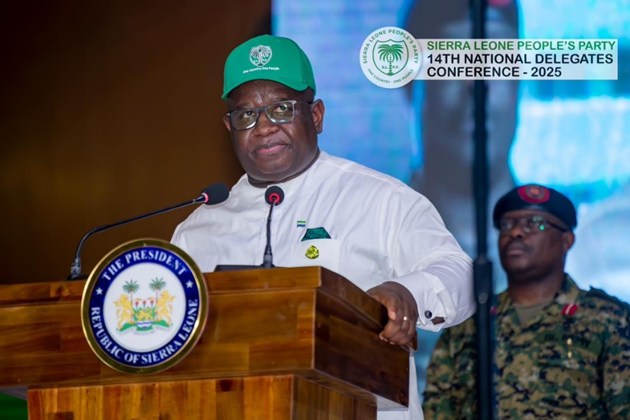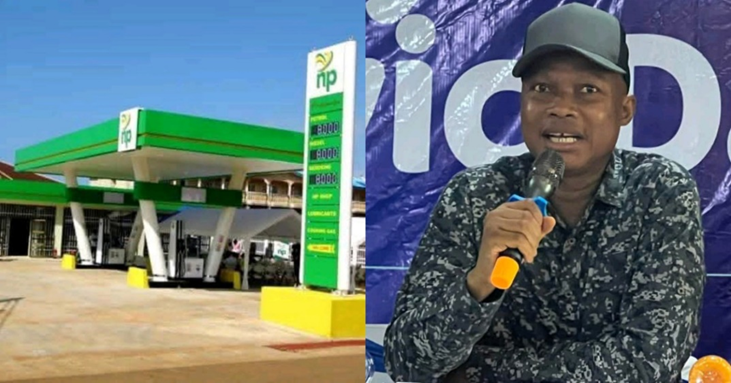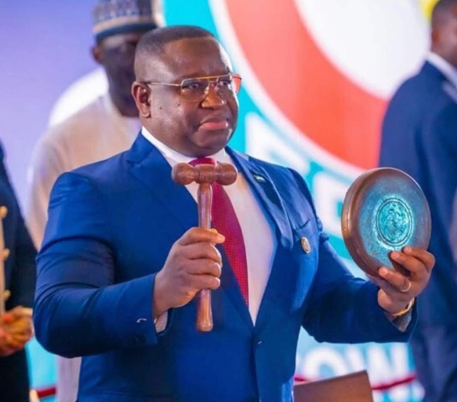By Mackie M. Jalloh
The Sierra Leone People’s Party (SLPP), the country’s oldest surviving political organization, stood at a pivotal crossroads during its 14th National Delegates’ Conference held at the Bintumani Conference Centre in Aberdeen, Freetown. What might have once seemed a routine gathering of party faithful evolved into a powerful display of political introspection, generational transition, and strategic positioning for the future.
More than just a venue for internal elections or ceremonial speeches, this year’s conference offered a rare moment of ideological reckoning for a party that has both ruled and opposed across multiple political regimes. From seasoned veterans and grassroots mobilizers to newly minted youth leaders and civil society observers, the conference welcomed over 1,500 participants from across Sierra Leone’s twelve districts and diaspora constituencies.
The atmosphere inside the grand hall was charged with anticipation. Banners with the party’s green colors fluttered as chants of “One Country, One People” echoed between deliberations. Security was tight, but the mood was buoyant—reflecting the SLPP’s continued hold on state power, yet aware of the mounting pressures ahead of the 2028 General Elections.
At the heart of the conference was a strong push for internal reform, generational renewal, and clarity of purpose. The outgoing executive, led by National Chairperson Dr. Prince Alex Harding and Secretary-General Umaro Napoleon Koroma, used their final addresses to both reminisce on hard-fought political victories and issue stark warnings about the dangers of complacency, internal divisions, and unregulated ambition.
Dr. Harding, who has served the party for over two decades in various capacities, delivered a keynote that veered between nostalgia and political realism. Aware that this would be his last official act in the role, he did not mince words.
“Our strength has always been our ability to rise from setbacks. But history has taught us—many times—that our greatest threat often comes from within. Factionalism is poison. If we want to keep governing, we must be bigger than our personal ambitions,” he declared to loud applause.
Harding spoke about the SLPP’s survival through the turbulence of the 1990s—its return to competitive politics in 1996, its landmark electoral win in 2002 under late President Tejan Kabbah, and its painful years in opposition before the 2018 resurgence with President Julius Maada Bio. Through it all, he argued, unity and loyalty to democratic values remained the party’s most enduring legacy.
Outgoing Secretary-General Umaro Napoleon Koroma, visibly emotional during his address, reflected on what he termed “eight years of rebuilding.” He recalled inheriting a fractured party after bitter legal disputes in 2017, and transforming it into a disciplined political machine capable of winning back-to-back elections.
“When we came in, we had one goal: to remove the APC from power. We did. But beyond the victory, we built institutions—functional district structures, youth wings, women’s wings, and diaspora engagement,” he said.
Koroma also took time to acknowledge the personal sacrifices behind political service, thanking his wife Hawa for “holding the home together while I served this party on the road.”
But like Harding, he did not avoid warning signs. “Power is fleeting if not managed with humility. To those taking over today, I say: respect the structures, honor our history, and prioritize national interest.”
When President Julius Maada Bio rose to speak, the room fell silent. His presence was not just symbolic—he is still the de facto leader of the party and its most recognizable figure on the national and international stage.
But his message was measured, mature, and intentionally non-partisan within the party framework.
“I want to be clear—I endorse no individual today. I endorse the process,” he said. “The future of this party—and by extension, the nation—must not be held hostage to backroom deals or ego contests. Let the people choose their leaders, freely and fairly.”
President Bio emphasized discipline, ideology, and continuity as the cornerstones of future SLPP success. With the next general election in 2028 approaching, he reminded the audience that the party’s biggest challenge was not the opposition, but disunity.
“We cannot win divided. Leadership is not about age or appearance—it is about ideas, temperament, and vision. Let us embrace generational transition, but with guidance and mutual respect,” he urged.
What made this conference particularly distinct was the array of observers and well-wishers from across the political spectrum.
Ambassador Osman Yansaneh, Acting Chairman of the opposition All People’s Congress (APC), made a surprise appearance and was warmly received by both delegates and SLPP stalwarts. In his address, he emphasized democratic maturity and urged political actors to rise above partisanship.
“My presence here is not to campaign—it’s to commend. The SLPP has shown what internal democracy can look like. We must all emulate that. We are competitors, not enemies,” he said.
Similar messages of goodwill came from the All Political Parties Association (APPA), represented by Secretary-General Ibrahim Sorie Sesay. He highlighted the SLPP’s role in safeguarding peace post-war and praised its ongoing contribution to democratic governance.
“Your legacy is not only in elections won but in the democratic culture you continue to shape. We hope your deliberations today will echo positively across the political space in Sierra Leone,” Sesay noted.
Outside the main conference room, parallel breakout sessions were held on youth empowerment, women’s leadership, and digital political organizing. These forums were spearheaded by the SLPP National Young Generation Council and the Women’s Wing, signaling a broader attempt to integrate emerging voices into the party’s strategic direction.
Young delegates, many of whom had never attended a national conference before, expressed optimism that the party was finally ready to listen.
“We don’t just want positions—we want our ideas taken seriously,” said Mariatu Bangura, a youth delegate from Kenema. “We’re not asking to lead tomorrow. We’re asking to be involved today.”
The conference closed with the election of new executives through a hybrid of open balloting and consensus-building. While the full list of winners is expected to be gazetted by the party secretariat within days, the message from the floor was clear: transition with dignity, lead with integrity.
As the sun set over Aberdeen on July 30, 2025, the SLPP’s leadership torch passed to a new generation. Whether that torch lights the way to continued governance in 2028 remains to be seen—but for now, the SLPP has once again placed unity, internal democracy, and national development at the center of its political journey.



